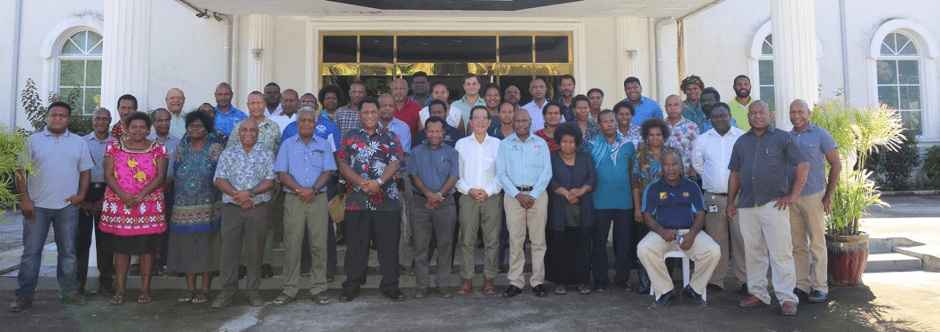
Agriculture Sector Planning Retreat Focuses On Climate Change
Port Moresby, 26 April 2018 –The Government of Papua New Guinea (PNG) is conducting a sector by sector planning retreat as a significant step to ensure key sectors such as lands, forestry, agriculture, environment and conservation are strengthened and well aligned to address climate change.
The last was the agricultural sector planning retreat held in West New Britain Province (WNBP) last week.
Climate change remains a huge challenge for PNG at present. Extreme weather patterns, rising sea levels, floods, landslides and crop failure experienced around the country are classical examples. The impacts of climate change on the lives of local communities requires strong and efficient measures to address it at the policy and decision-making level.
 Photo: Participants of the Agriculture Sector Planning Retreat posing for a group photo. (Photo Credit: UNDP/FCPF)
Photo: Participants of the Agriculture Sector Planning Retreat posing for a group photo. (Photo Credit: UNDP/FCPF)Considering this need, the PNG Government through the Climate Change Development Authority (CCDA) with the support of the United Nations Development Programme (UNDP) have been facilitating key sector planning retreats in the past. These planning retreats focus on how best respective sectors can protect the “lungs” of the earth and minimize the release of gases that contribute to climate change.
Key actions were formulated on how each sector can implement to minimize the release of the gases and enhance local economic opportunities. Strengthening land use planning and management by the lands sector for instance, would reduce current and future risks associated with climate change and allow land developments are carried out in a coordinated manner, with less impact on the environment. Similar applies to the other sectors.
The Agriculture Planning Retreat last week in West New Britain Province evoked key sectors to align their work towards addressing climate change considering that they all have key roles to play in addressing climate change. Hosea Williamson, the Provincial Administrator highlighted sector alignment to address climate change as key.
“Agriculture development, among other sectors such as forestry and mining does contribute negatively to our environment and climate as is evident in WNB. It is therefore important that agriculture developments must executed in a way that addresses climate change,” said Mr. Williamson.
Stephen Mombi, Deputy Secretary for Department of Agriculture and Livestock (DAL) Technical Services also shared the similar sentiments by further encouraging the other sectors to be mindful of their business and their impacts on the natural environment and climate that could potentially jeopardize the wellbeing of the present and future generations.
“We must learn from the history of our rural farming communities as well as ancient civilization on how they were able to institute rules and regulations to control and minimize practices that had the potential to disrupt society in order to make better choices,” said Mr. Mombi.
Gwen Sissiou, General Manager for CCDA REDD+ Division further highlighted the need sectoral policy framework in place to align with the National REDD+ Strategy. The strategy aims to strengthen the sustainability of PNG’s forests, support agricultural development, protect environment and improve land use planning and management.
“To align the sector with the REDD+ National REDD+ Strategy, there has to be policy framework in place. The legislations need to be passed by the government.” Ms. Sissiou said, “Through these legislations, the administration and investment arrangement will be in order and will allow for coordination and implementation of REDD+ actions related to the Agriculture sector.”
“All sector-based retreats are led by sectoral government agencies and UNDP continues providing financial support towards implementation of sector-based plans in line with the National REDD+ Strategy to ensure wellbeing rural communities and maintaining natural resources in a sustainable way,” said Mirzohaydar Isoev, UNDP Chief Technical Advisor on REDD+.